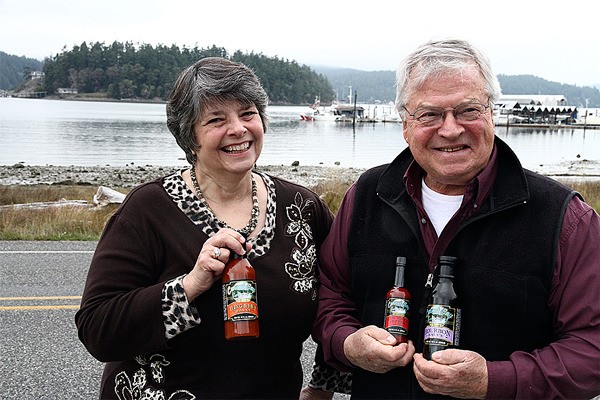Sure it takes good recipes to get food products onto grocery store shelves, but it also takes perseverance and self-confidence — and a good story never hurts. Arnie Deckwa has all of those down, especially the story.
This certified “character” who, with his wife, Joanne, operates the Cornet Bay Co. from the house he was raised in, has been written up countless times, including by the Wall Street Journal. In 2011, he published his autobiography, “The Singin’ Salmon Man from Cornet Bay.”
“Competition for shelf space is everywhere, and you have to be on top of it,” Deckwa, 74, said in a recent interview. “Excitement sells. The story sells.”
For nearly 30 years now, Deckwa’s story has been helping to sell the Cornet Bay Co.’s sauces, jelly, salsa, salad dressings, cheese balls, grilling planks, seasonings and salmon, shrimp, crab and lobster dips. It’s an unusual, appealing saga.
Deckwa grew up fishing commercially with his father, though early experiences with the accordion and then the guitar also evoked a love of music. And he fancied the life of a cowboy, once riding a bull in a Skagit County rodeo for roughly four seconds.
At various points he worked as a construction contractor and a deputy sheriff. In 1987, he moved to Nashville to try making a living writing and singing country and gospel songs. That worked out better than the bull ride, but he never made or wrote a hit record, though he did tour internationally with at least one band he put together.
His big break was culinary rather than musical, and it came while hanging out backstage at the Grand Ole Opry. His mom had sent down some of her renowned smoked salmon — an unknown foodstuff in the land of BBQ and deep-fried everything — and Deckwa brought it for his musician friends to try. One of them urged him to go into business with it, selling it to grocery giant Kroger.
“I had no idea this was the largest grocery chain in the nation, but I thought maybe I could market it as something from ‘that cowboy who comes from the Northwest,’” Deckwa recalled.
He began offering smoked-salmon dip to customers at seven Kroger stores near Nashville, though he was selling only the salmon and giving away the recipe to make it into dip. One customer insisted on buying the dip itself, and “that’s when the flashbulb went off,” he said.
“It was one of those moments that change your life.”
The first batches were made by hand and took hours. Gradually the process was automated. He built his own manufacturing facility in Nashville, and then it was farmed out to commercial food manufacturers across the country. Deckwa added a Cajun smoked-salmon dip and a crab dip to his line. Kroger eventually put them into more than 200 stores, and over time put its own label on seven of his products — a strong endorsement.
Deckwa has always retained the trademarks on his products and has protected the recipes with nondisclosure agreements, he said.
He returned to Cornet Bay in 1997 with Joanne, the woman he’d met and married in Nashville, as his new business partner. An unexpected snowstorm that held up delivery of the perishable dips showed them the value of adding seasonings, sauces and other non-perishables to their line. Now they sell roughly 30 products through QFC, Fred Meyer, Kroger and King Sooper stores, though not all chains carry the same number or type of items. Some carry the Cornet Bay Co. label, while others are store-branded. About one-third are the company’s original recipes, and the rest reflect the company’s tweaks of existing recipes.
No production takes place in the Cornet Bay headquarters. The company, which has no employees or external investors, has been consistently profitable for years, the couple said. They declined to reveal their annual revenue. The Wall Street Journal put the figure at about $1 million in 2002.
The Deckwas declined to comment on that report.
The business is in a perpetual state of change. Joanne, 64, tends to financial and administrative matters, and frequently experiments to create new sauces, seasonings and recipes that use them. Arnie crisscrosses the country, calling on food-store buyers and “doing things to create excitement that makes things pop. As a supplier, out of sight is out of mind.”
The couple tests new ideas on their frequent dinner guests, sometimes even distributing evaluation sheets. Their most recent innovations, all created by Joanne, are a “Wing and BBQ” sauce and four gourmet dips — sun-dried tomato crab, shrimp artichoke, tropical lobster and chipotle smoked salmon — that will soon be carried by a major grocery chain they declined to name. They are about to launch an online store.
Though family members have worked for the company for brief stints, no successor has emerged to carry on after the Deckwas retire, which they said may not be for years. Until then, “we want to go into other chains across the country,” Arnie said. “We have staying power.”
Buddy Hayes, of Bon Aqua, Tenn., was working as head of the seafood department of the Kroger store in Brentwood, Tenn., in about 1987 when he met Arnie pitching his smoked salmon. Together they mixed up the first batch of salmon dip in the store’s work area, Hayes said.
“We started offering samples and everyone liked it. That was how he got started. He’s an all-around good guy and we are still good friends. He talks funny ‘cause he’s from the Northwest, but other than that he’s alright.”
For more information about Deckwa’s business, log on to www.cornetbay.com



